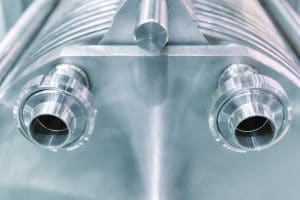 The many significant differences between older cooling solutions and modern heat exchangers typically stem from one main transformation – the way in which they approach electrical cooling. Traditionally, electrical cooling units were comprised of air conditioners or air compressors, which keep electrical enclosures cooled by circulating chilled air throughout their interiors. By contrast, modern heat exchangers operate by continuously transferring electrical waste heat away from sensitive electrical components, before it has a chance to accumulate. This creates a multitude of advantages over more conventional cooling solutions, including significantly reducing the costs of a company’s operations.
The many significant differences between older cooling solutions and modern heat exchangers typically stem from one main transformation – the way in which they approach electrical cooling. Traditionally, electrical cooling units were comprised of air conditioners or air compressors, which keep electrical enclosures cooled by circulating chilled air throughout their interiors. By contrast, modern heat exchangers operate by continuously transferring electrical waste heat away from sensitive electrical components, before it has a chance to accumulate. This creates a multitude of advantages over more conventional cooling solutions, including significantly reducing the costs of a company’s operations.
The value of natural heat transfer techniques
Transferring waste heat is the cornerstone of how modern heat exchangers operate, and they accomplish it using much more efficient and natural means than traditional cooling solutions. Within a heat exchanger, an eco-friendly cooling fluid is able to rapidly absorb and transfer waste heat to a heat depository, such as a custom heat sink, before cycling back and absorbing more heat. This cycle is contained within streamlined heat exchanger designs, such as cold plates or heat pipes, and can continuously keep electrical enclosures cool for technologies of all types.
The reduced costs of streamlined cooling
The ability to rapidly transfer waste heat makes heat exchangers highly valuable to companies in a variety of industries. Most companies rely on several different forms of technology to power their operations, and each requires an adequate thermal management solution to prevent its electrical enclosures and components from overheating. The costs of maintaining these solutions grows exponentially the more a company relies on technology, and heat exchangers have proven essential in helping companies control those costs. For example, without the need to generate chilled air on a consistent basis, or the complex mechanical equipment necessary to facilitate it, heat exchangers can provide high-performance electrical cooling with minimal amounts of energy and little or no need for repairs.
The expanding benefits of heat exchangers
By streamlining the process and reducing the costs of electrical thermal management, heat exchangers have helped companies take greater advantage of more advanced technologies. This has equated to heightened levels of efficiency and productivity, as well as room for greater innovation. The ability to absorb and transfer waste heat has also given heat exchangers several additional roles in other areas of advancement, such as helping companies implement greener and more eco-friendly operations. For more information about streamlined approaches to electrical cooling, call Noren Thermal Solutions in Taylor, TX, at 866-936-6736.







